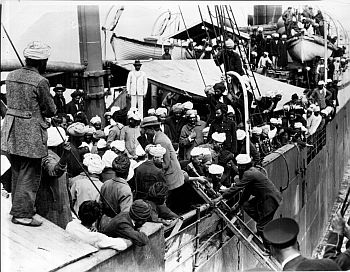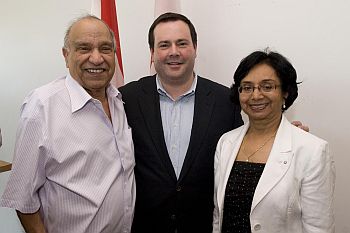Kenney announced on August 1 at the Sunset Community Center in Vancouver about the formation of this committee that will be chaired by Jack Uppal, a businessman from Vancouver, with Prof. Ratna Ghosh of McGill University and Iqbal Gill, a teacher in the Peel District School Board (Brampton and Mississauga) as its other two members.
These three members, Kenney said, have already met once and looked at some of the projects that the community groups have submitted for considerations part of the mandate of the committee of advising the minister as to which of the projects they would recommend for the minister's approval.
Kenney said they have put in $2.5-million for various projects that could help create awareness about the wrongs done to the community in 1914 when the Komagata Maru, a ship from Hong Kong, carrying 376 Indians was not allowed to disembark.
"Because the ship didn't make a continuous journey to Canada, as prescribed by immigration regulations at the time, only 22 of the passengers, those were the returning Canadian residents, were allowed to land in the port of Vancouver," Kenney quoted from the historical record. "After a two-month standoff with authorities the ship was escorted out of Canadian waters and returned to India, where British officials intended to transport passengers to the Punjab. This resulted in a riot which we recall, where 29 passengers were shot by British soldiers and 20 of whom tragically died."
Kenney emphasized establishing the Community Historical Recognition Program 'is tangible proof of our government's determination not only to acknowledge the hardships faced by the Indo-Canadian community, but also to use education to fight racism and to embrace diversity in today's society.'
The projects that will finally be approved under this $2.5-million federal government allocation, federal Immigration Minister believes, will 'transmit into the future the memory of the experience of the Komagata Maru, so that not just children going to school today but their children and their children's children will remember that there was a time in Canada when we weren't a welcoming society, when the doors of opportunity were not always open.'
In his brief remarks, Uppal called allocation of $2.5-million 'for projects that recognize Komagata Maru incident as a wonderful gesture.'
As chair of the committee, Uppal emphasized 'we will conduct our work seriously to recommend the best possible project for informing and educating the general public about this incident.
"As members of the committee, we want to help all Canadians understand the Komkagata Maru incident and the early experiences of the Indo-Canadian community," Uppal added.
Photographs and Text: Ajit Jain in Toronto
'History doesn't include Komata Maru incident'
Image: Members of the Committee (from left) Jack Uppal, Immigration Minister Jason Kenney and Prof. Ratna GhoshGhosh teaches race relations, diversity at McGill and she was surprised that a group of teachers and would be teachers didn't know anything about the Komagata Maru. Therefore, it is important, "Not only Indo-Canadians to know about it, I want all Canadians to know about this incident, including the French Canadians to become aware of it."
"History", Ghosh said, "is more about this kind of thing and that awareness will come through several projects, educational material to include this incident."
"My interest in the whole project is the history that's taught in schools. It doesn't include the Komagata Maru incident and people don't know about it. So, I want all Canadians to know about it as more people have access to this knowledge the better for Canadians," she said. "The Canadians ought to know what kind of policies we had before and there were some important wrongs done, a blot on Canada's whole idea of diversity."
Komagata Maru is not a Sikh issue or a Punjabi issue, Ghosh noted. "As far as I am concerned, it is an Indo-Canadian thing as of 376 passengers on board Komagata Maru, 24 were Muslims and 9 Hindus. There's a dissension within the Sikh community itself. In my mind it shouldn't be deemed as a Sikh issue."
The Committee's term is 2 years by which time $2.5-million "will run out," Ghosh said.
Film director Deepa Mehta is currently busy shooting a film on Komagata Maru tragedy, in which the leading role is being played by Bollywood heavy-weight Akshay Kumar. There's no indication as to when the film will be released but most likely it will be sometime next year.



article